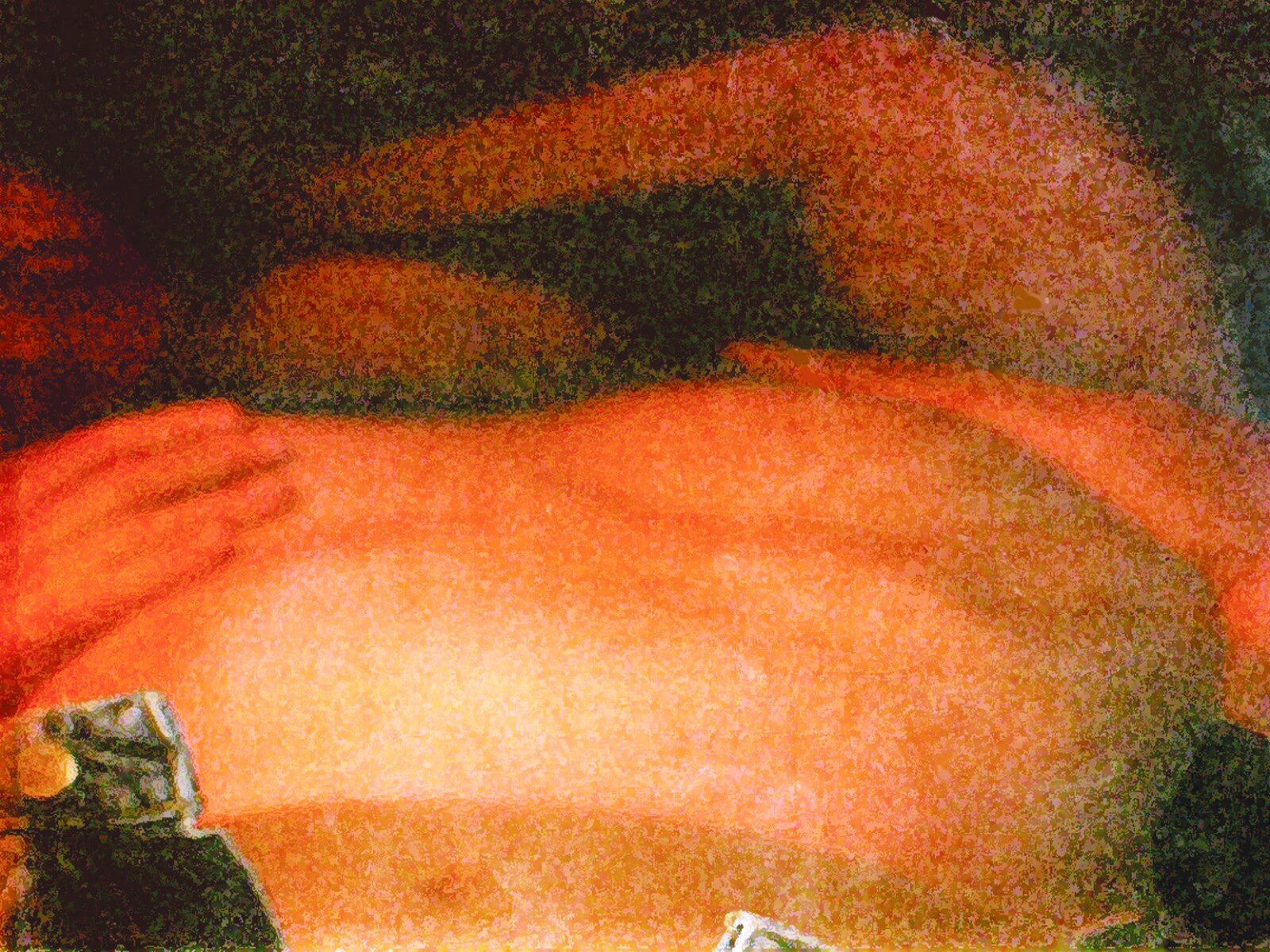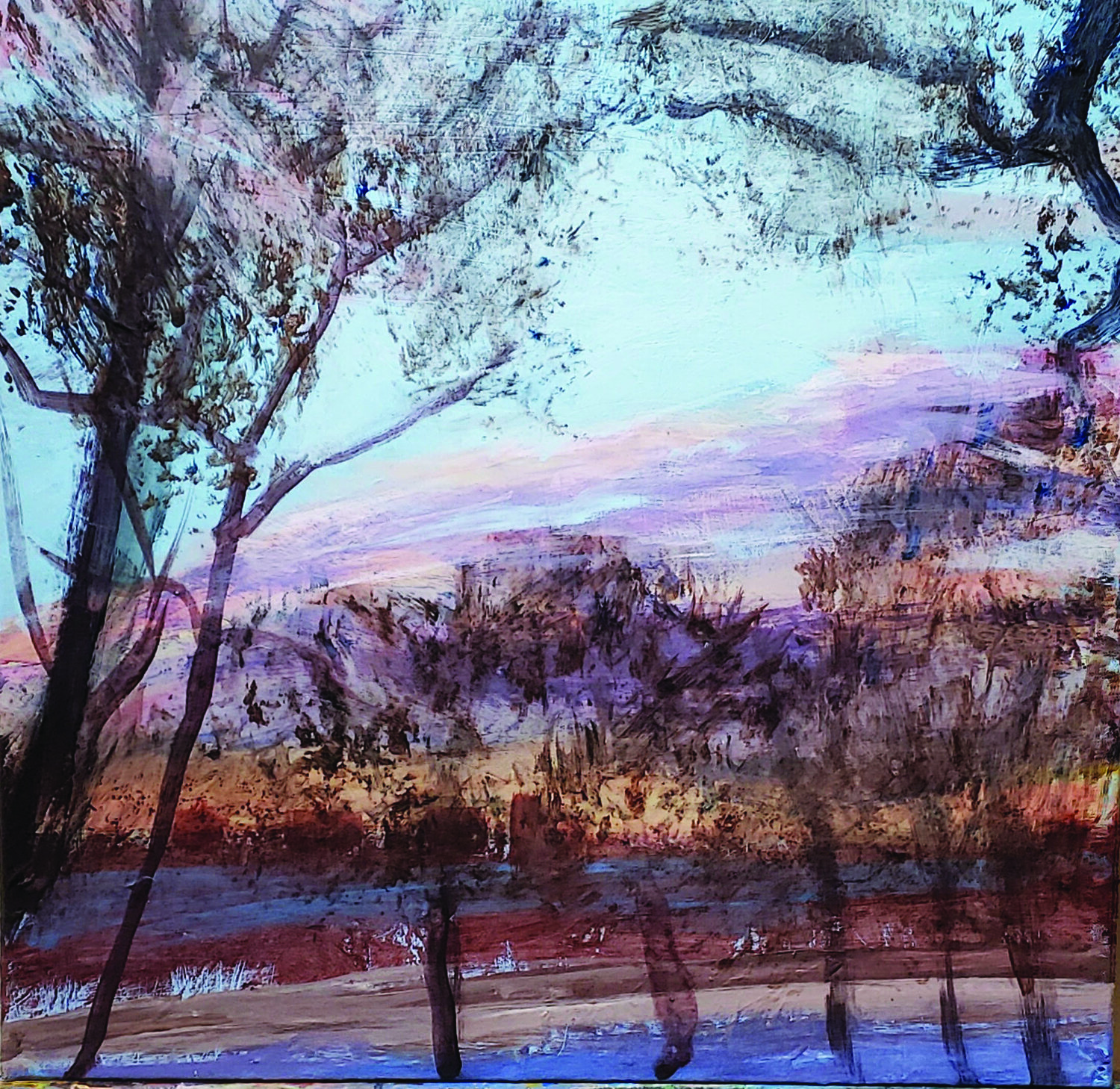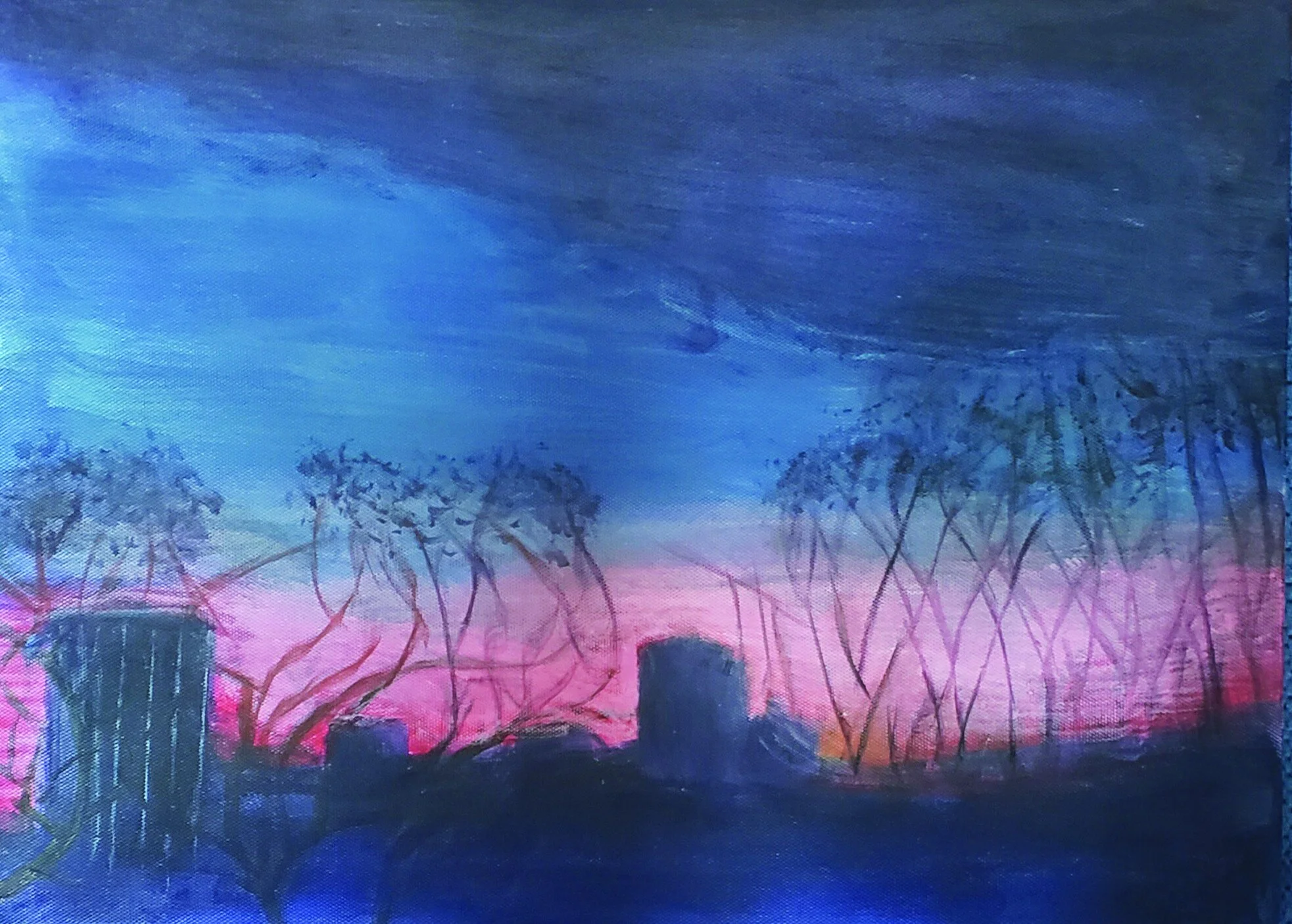ON LEARNING LATE IN LIFE
THAT THE SHEMA IS A HAIKU
by Jessica de Koninck
Listen up people
we may not understand but
the whole project works
*
Often before lunch
I’ll look up from my laptop
stare out the window
*
In the center of
multiple universes
outside is inside
*
That sole apple tree
contains as much wisdom as
anyone can lift
*
Inexplicable
Multijurisdictional
Collaboration
*
Not a goose in sight
Where are all the birds today
Oh, now I hear them
*
I’ll tell you something
the source is all around us
everywhere we look
Doug Eisman
AFTER THE LONG WINTER
by Elaine Koplow
spring blusters forth like a wildflower
salesman peddling his wares from door
to door — stopping at every meadow
and lawn up and down the road.
Every year the return. Yet every year
a surprise.
Vibrant yellow along the fence —
the revenge of the forsythia I cut back
last fall. The hyacinths have unfolded
into purples and pinks, and crocuses
are jostling with daffodils in the breeze.
Shrubs long naked have put their clothes on —
all green and red and white. No longer
dormant.
And we are like the bare-branched
trees — storm-tossed but not broken —
ready to shed our winter skins, the need
for renewal reaching far deeper
than the roots of the perennials.
If only it were so easy
for us — to put our feet into the soil
and let the sun bring us to life.
“Postage Due” by Marc Shanker
Alte #11: OPEN CALL
100 WORDS
by Lawrence Bush
STOP! STOP! STOP. STOP. STOP. STOP! STOP. STOP. STOP! STOP! STOP. STOP. STOP. STOP. STOP. STOP! STOP. STOP. STOP. STOP! STOP! STOP! STOP! STOP. STOP. STOP. STOP. STOP. STOP. STOP. STOP. STOP. STOP. STOP. STOP. STOP. STOP. STOP. STOP. STOP. STOP. STOP. STOP. STOP! STOP. STOP. STOP! STOP. STOP. STOP. STOP. STOP! STOP! STOP! STOP. STOP. STOP. STOP. STOP. STOP! STOP. STOP. STOP. STOP. STOP. STOP. STOP. STOP. STOP. STOP. STOP. STOP. STOP. STOP! STOP! STOP. STOP. STOP. STOP. STOP. STOP. STOP. STOP. STOP. STOP. STOP. STOP. STOP. STOP. STOP. STOP. STOP. STOP. STOP. STOP. STOP. STOP! STOP. STOP. STOP!
“Amber” by Dana Jacobs
RESOLUTIONS
by Barry Savits
I resolve to cry less,
weighing myself down
among the throngs of my fellow travelers
and feeling guilty.
It seems their needs are so great
that I cannot easily solve them,
sometimes not even one at a time.
So . . .
I resolve to exercise a more personal path
To be more out of the home active.
To increase my scope.
To making telephone calls,
communicating more
with my family and friends.
I want to realistically continue
my new found journeys in person,
though only if nature is willing.
Why not wish upon the stars.
They shimmer above for us
to see and enjoy their light.
Why not resolve to include them
in my embracing arms.
Maybe they will blink
in appreciation.
I’M GETTING OLDER
by Esther Cohen
Some years ago I said to an agent
before I actually was
This Much Older
I wanted to write a book titled
I’m Getting Older.
She said No One Wants to Hear That
and when I asked Why Not she said
It’s Just a Fact
and although I didn’t believe her
I didn’t write the book.
Even older today I wonder
what I would say now.
I wouldn’t talk about body parts
no organ recitals
wouldn’describe gastroenterologists
or even my favorite doctor endocrinologist
with the unlikely name of Clifton Jackness
mildly religious Jew I would
probably tell the story of a woman
named Naomi I met on the bus
just a week ago.
Naomi had a walker and large
vintage earrings. Can we talk
about our sex lives asked Naomi,
a total stranger who described herself as
a political activist. Presuming you have one
she added. Yes I do I replied.
So do I said Naomi.
And we both laughed.
“Demon Lover” by Lawrence Bush
WHAT DO WE KNOW
by Steven J. Gold
The vast depository
Of collected human knowledge and wisdom
Comes crashing down
In a pile of meaningless rubble
When confronted with
The presence
Of a tree’s green leaves
Shimmering in a breeze of
Golden light
Green leaves
Shimmering in golden light
WHAT I WANT TO BE WHEN I GROW UP
by Roni Fuller
“It’s not what you are, it’s what you don’t
become that hurts.”
— Oscar Levant (age, irrelevant)
“What a mess I’ve made of my life,
but oh, what a life I’ve made of my mess.”
—Roni Fuller (age, 30)
1958—Great dreams,
traveling to see the world,
make a name for myself,
show them all I can be the best,
damn the nay-sayers,
I will be there, profound, famous.
1968—So much has gone wrong,
college career dismal so far,
dead-end jobs, the dreams paled,
a disastrous, illegal war,
political turmoil, Capitalist greed,
the future looking grim.
1978—I guess I grew up,
at least a little bit.
Wife, child, a real profession—
HOUSEHUSBAND!
Writing like mad,
not yet ready to say “poet,”
but forty years old,
happy to be here.
1988—Still househusband,
becoming a poet,
thinking there is a novel in me,
three children, same wife,
settled, but more radicalized,
growing crops, cutting wood,
making a life unimagined in my past,
a pillar at Temple Beth-El,
Chair of Central America Task Force,
New Jewish Agenda.
1998—A year in Israel gone by,
children both struggling and thriving.
A poet: yes.
A novelist: no.
A crisis: wife has cancer.
2008—Wife is dead,
Two grandchildren now in my life,
Three books published,
and writing, writing, writing.
Age is not as hard as it might be,
and I walk, have friends,
my children are good to me.
What next in this crazy world?
2018—Another book, a publisher,
something more than a wish,
someone unknown likes my poems.
2022—Looking back, three long sequences,
each life-changing in many ways:
fifteen months on the Navajo Nation,
one year on Kibbutz Hanaton in Israel,
ten months in El Salvador.
An amazing life I had, am having,
a perfect wife, lost too soon,
exciting and interesting children,
wonderful grandchildren (now five),
and there is the future —
perhaps I’ll find out
what I want to be when I grow up.
“The Journey” by Marc Shanker
A PHONE CALL FROM SEYMOUR
by David Koulack
“Hi David,” he said, “it’s Seymour.”
“Hi Seymour,” I practically shouted. I was delighted to hear from him. We go back a long way — to 1968, when we were hired by Alf Shepard to teach at the University of Manitoba. It was quite a coincidence. Both of us Jews from the Bronx, the first Jews, as it turned out, to teach in the psychology department.
Memories came flooding back as we talked, and Seymour’s New York accent, much more profound than mine, permeated the conversation. We reminisced — there were so many fun and crazy things we had done together.
“Do you remember that poker game?” I asked.
“You mean the one when Al left the game early in a huff, stuffed his feet into Ed’s shoes that were a size too small and wore them for a week complaining all the time that his feet were sore?’
“Yeah, that’s the one.”
“And what about that ice fishing gig?” Seymour asked.
How could I forget it? There were six of us, all novices, at the ice fishing game. Someone had rented an auger, and I think it was Gerry Erickson who’d borrowed two tip-up poles that raised a flag when there was a bite. Seymour, who didn’t drink, drove us to Netley Marsh in his van, and after we drilled a hole in the ice and set up the rods, we retired to the van to play cards, all except Gatley that is. He got drunk and ran around the ice, bothering the few people who were there.
“You guys charged me with keeping him safe,” I said accusingly to Seymour. “I had to keep pulling down the flaps on his hat so his ears wouldn’t freeze.”
Seymour laughed at the recollection. “Yeah and remember how many fish we ended up catching? Good thing our wives went out and bought fish and had a bouillabaisse ready and waiting when we got home.”
“Hey, and what about those squirrels you harbored?” I asked, referring to the several occasions that I’d had to drive Seymour to a garage on McPhillips to pick up his car after it had been rid of a family of squirrels that had used its engine for a home during the winter.
But the truth was, those days were long gone. Reminiscences were all they were. Instead, Seymour and I had settled into a more or less steady routine. We’d go out for lunch on occasion. We’d call each other up when it was time. We lived a few blocks from each other, so I’d drive over to his house and wait while Seymour made his way along the walkway of his house to the car. Then I’d get out and hold the door open and help him into his seat.
Seymour knew all the restaurants in town so he’d get to choose where we’d go and he’d generally order for both of us. We’d sit and talk and laugh. Often the people at the restaurant would recognize Seymour and drop by our table to ask him how he was doing and chat for a bit.
But then Seymour moved into a condo and I moved across the river, and our lunch time meetings became less frequent. We didn’t exactly lose touch, but we just weren’t as prominent in each other’s lives as we had been before. And here, out of the blue, he’d called and we were reminiscing and laughing together, and I remembered how much I missed him. Maybe we’d go for another meal, I thought. Then Seymour told me why he had called. “I’m calling to say good-bye.”
I wasn’t sure what he meant.
“This afternoon I’m going to have myself killed,” he said. “I meet all the requirements. My cancer is in its terminal stages and I’ve got all my marbles. It’s one of the good things about Manitoba. Assisted dying is a right, and I intend to exercise that right this afternoon.
“I just turned 87 yesterday and I think that’s enough. I’ve organized everything. My ashes will be scattered in the Lake of the Woods, except for a smidgen which will be scattered at the 174th Street Station in the Bronx.
“So anyway, I’m just calling up to say goodbye. I don’t believe there’ll be anything going on for me when this is over, but if there is, I’ll be sure to let you know.”
“Houdini like?” I asked.
“Yes,” Seymour answered, and we both chuckled before he hung up.
“Pandemic Goodbye” by Jeff Blum
HERE AND THERE
by Rochelle Shicoff
Here — Predictable tippling of chartreuse leaves
surrounded by screens of yellow chrome forsythia.
There — Skeleton trees smoked into burnt umber.
Here — Pink, orange, red tulips boated from Holland.
There — Cement into fine dust, twisted metal.
Here — Blossoms light the sky in straight,
40 foot white-to-be ornamental pears and apples.
There — Only black plastic, miles of body bags.
Workers gather, gather out of graves the plastic,
delivered to families holding shovels.
Here — Spring ground breaks for life.
There — Spring breaks the ground to receive
memories.
WHAT WE REMEMBER
by Norma Bernstock
Now when my father can’t even recall his wife’s name,
he still remembers that salami is his favorite food.
I see us all at Rockaway Beach,
the stained paisley quilt squeezed between
rented umbrellas and striped canvas chairs,
Beach 35th Street, close to the knish and hot dog stand
though we never bought a thing to eat.
Mostly it’s the scent of salami
and fresh seeded rolls that stays,
sandwiches thrown together early on a Sunday morning
when Dad awoke to a sultry sun and declared it a beach day!
Although Mom complained there was nothing for lunch,
we always had a Hebrew National salami in the fridge.
At times like this, Dad would volunteer
to pick up rolls at the bakery
while Mom scurried around the house
in search of the plaid, insulated beach bag
and the blue Coleman jug to be filled with Kool Aid
or some other sweet concoction,
and always a bag of over-ripe peaches and plums for dessert,
and the ride home in the car, salt-water hair
pasted back by the breeze,
damp swimsuits with sand digging into skin,
unable to breath deep from the salt in our lungs,
not knowing then that the taste and smell
of salami and rolls with seeds
would outlast the memories of a fifty year marriage.
NIGH NIGHT
by Rozann Kraus
Life is like
that
one letter altered
alerting not
none is changed
charged with meaning
leaning in ways
to sway
so close to being closeted
slow to understand
standing under the weight
of waiting
confessing confusion
the mirror miraculously
shows him young
ageless and agile
yet he is not.
As life
is like that
moving clockwise
wisely
RECEDING
by Ruth Wire
At ninety-three, my mentally intact mother
slowly loosens her hold on life.
Shoulder arthritis’ painful injustice
she treats with an onion poultice.
The doctor reports her body’s making
less than half the needed red blood cells;
nodding, pale, she jokes, “I can’t live forever.”
A faulty heart valve
that’s been a murmur all her life
now refuses to deliver all the blood
passing through its partly closed lips.
My mother shrugs and tells the doctor
she cooks good clam chowder,
and just taste the shrimp cocktails
for family dinners.
Immersed in red sauce,
it’s plump and pinker than she is.
She still lives in her mobile home
with flowers, trees, and a cat.
She waters the place from her walker,
but has energy for only one hour
before she needs two hours of rest.
We shop each week for grape juice, liver, and Green Magma.
Lately she’s been absent at Little League games,
music concerts, movies, and plays.
A library volunteer delivers books five-at-a-time.
She craves new things:
the energy to take a shower, to mop a floor,
to walk to the store.
She goes back and forth to the mailbox.
We visit the undertaker.
I cry softly while she plans her funeral.
Everything is paid for.
She lectures me on what to do with money
knowing I’ve never had much.
I think she’s taking this too calmly.
I ask, “Where’s your anger?”
“Listen,” she says, “I’m too busy enjoying my petunias
and the sun to be mad about anything.”
I hold her close.
She’s become so small and wrinkled,
also a little remote,
like someone fading in a silent film.
The other day she doesn’t answer the phone,
so I run over to find her on the porch
gazing at the potted geraniums.
“It’s such a nice day. Smell the air,” she says.
It’s sharp with cut-grass and
puffed with sweet alyssum.
“I feel dizzy,” she says, trying to rise.
Suddenly her head droops
and her voice comes from the dim world
that’s pulling her.
“Wha—Wha—na--ga.”
I call 911, but cancel the call
when she awakes by herself.
“It’s time for a little rest,” she says.
“The air makes me sleepy.”
But I know she visited her next home
to see if the plumbing is okay
before she moves there.
“Last Light on the Hudson” by Jeff Blum
REMEMBERING
by Shirley Adelman
The last branch has fallen
with the death XXXXXX of Ed Itzenson
who remembered the day
I was born.
Ed was one of the boys sitting
around our livingroom, noshing
fruits and sweets my mother
served, kibitzing with my brother
and their friends.
The boys’ voices drifting into
my room, lulling me to sleep.
Their laughter jarring me awake.
A late in life child: now
alone with memories.
HANGING LOOSE
by Mary K. Lindberg
No more mountains,
just small hills, fancy street
bumps. Skin, like breath,
begins to flag, hang loose.
Exploring reveals fault zones
and hairy surprises rising,
startled from a deep sleep
near spawns of speckled dermis.
Not a sudden landslide
bringing down homes,
nor a tornado whirling
skinny debris —
more like a glacier,
thinner skin exposing
twisted purple and blue
rivulets, adipose deposits
swaying in spite of
inner denial.
This is what sixty
looks like.







